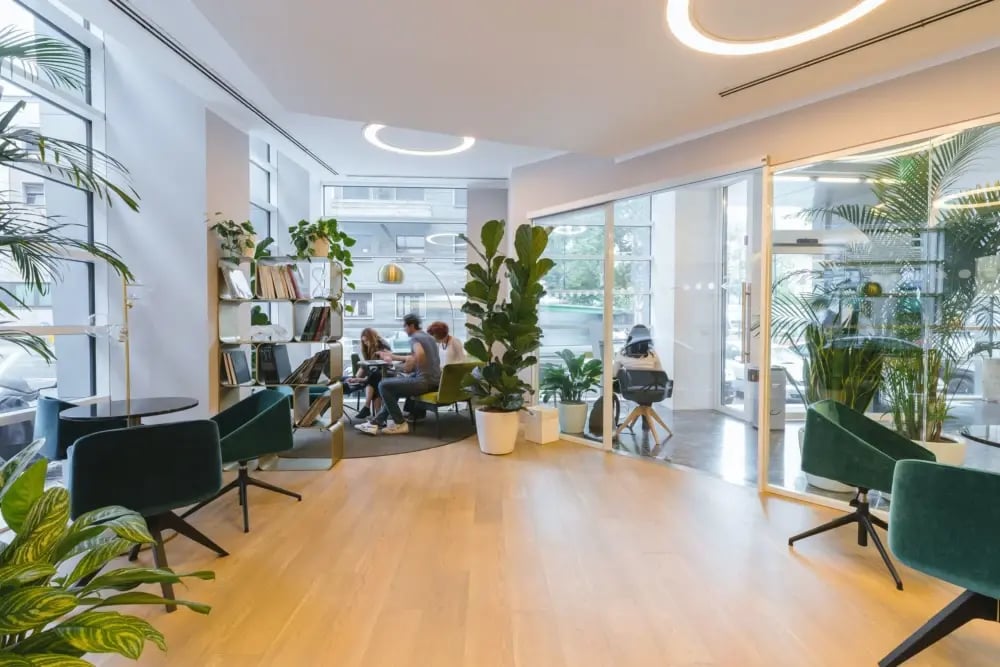To co-work or not to co-work?
The use of co-working spaces has catapulted in popularity and new buildings are popping up everywhere. We'll discuss how these spaces are used and by whom, along with some of the benefits and drawbacks compared with traditional office life.

What is a co-working space?
The meaning behind ‘co-working space’ is fairly intuitive - it is a large office space that is shared by a number of individuals and businesses all working independently.
There are usually a large number of rooms that can be rented by businesses and they all vary in size so you can have a private space for small businesses with as few as 3 members, or larger spaces of 30+ or possibly more. As your business starts to expand beyond this you may find that it becomes more suitable for you to purchase your own more permanent office space.
Co-working spaces usually have large communal areas, meeting rooms, breakout/canteen areas and desk areas that are available on a first come first served basis each day.
Who uses co-working spaces?
Co-working spaces are most popular amongst start-ups, freelancers, entrepreneurs and SMEs. Businesses that have 50-100 employees tend to find that co-working spaces can no longer meet their demands so will opt for their own private office.
What are the benefits of co-working spaces?
- Networking opportunities – lots of like-minded businesses around. Provides the opportunity for collaboration with other small businesses on projects. The co-working spaces usually host social and networking events that you can take advantage of.
- Flexibility – you can change your office space as your business grows. It also allows teams to work part-time from the office and part-time from home, reducing the number of desk spaces needed. It gives you a space where you can all meet regularly without the big commitment of your own permanent office.
- Professional environment – you will have access to meeting/ board rooms, it is a great environment to host meetings with potential clients/ investors. It also gives you a business address to trade from.
- Good working atmosphere – great culture, they are designed to promote productivity – there is evidence to support that co-working spaces improve the productivity of teams. They achieve this through lots of natural light, by optimising the temperature, and a variety of work areas to suit different working styles.
- Often co-working spaces have several developments around the country. This means that remote workers can use the membership even when based in other parts of the country (if there is one nearby).
What are the disadvantages of co-working spaces?
- Less privacy than if you had your own space - you can have your own office within the building but usually they have large glass windows (so you might not want to work on your super secret project!)
- More noise and distractions – this is somewhat inevitable in a co-working space due to the number of businesses and individuals sharing the space. If you have your own office space within the development, this will impact you less as you can close the doors to minimise the noise.
- Reduced ability to grow – although there is the flexibility to move spaces within the co-working space, this will be subject to availability and you may have to wait for some time before a larger space becomes free. As a result this could slow down your growth if you are growing rapidly.
How do I know if a co-working space is right for me?
Book a free tour of a few to get the feel for them - this will allow to ask you all of the questions you have that will help you to establish whether it is right for you.
Each co-working space is different so it’s likely that you will find your business is highly suited to some and not to others.
At Capsule, we decided to purchase our own office space in a co-working development in Cheltenham.
This has worked well for us as it acts as a base for the team and clients to meet, without having to commit to a larger space that would force all team members to be in the office full-time.
We've therefore maintained a strong work-life balance while getting structure and the ability to collaborate, which would be more difficult if we were working from home full-time.
The branch of co-working spaces that we have enrolled with also have developments in Bristol, Manchester, and London, which gives us the flexibility to work and meet clients in any of these locations at our convenience.
